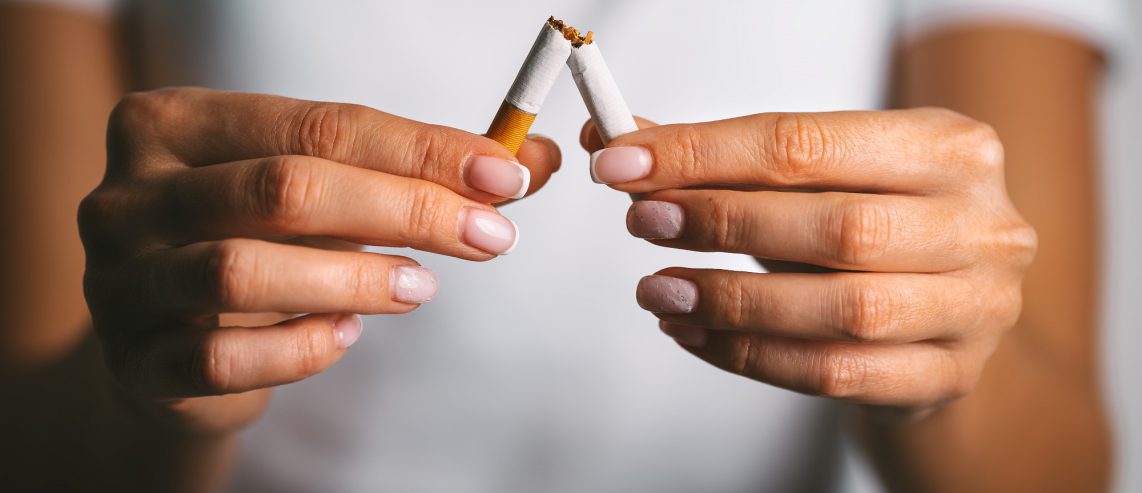Becoming a smoker was a journey.
The journey probably began years ago when you started experimenting with your first cigarettes. Those first few cigarettes probably weren’t so good.
But as time passed, your body got used to smoking, and you began to crave the feeling you got from lighting one up. Smoking became a part of you.
Becoming a nonsmoker is also a journey.
Think of this as a starting point in a learning process, with change occurring over time. As time passes, you’ll learn more about becoming a nonsmoker and developing a new identity.
Remember: You’re not your cigarettes. An addiction to nicotine doesn’t define you.
Never Miss a Beat!
Subscribe to Our HealthBeat Newsletter!
Thank you for subscribing!
You can now select the specific newsletters you'd like to receive.
You are already subscribed.
Subscribe to more newsletters in our email preference center.
Sorry, an error occurred. Please try again later.
Get Healthy Tips Sent to Your Phone!
Reasons for Quitting Smoking
There are many good reasons for starting a tobacco cessation program. Besides the many obvious health benefits to quitting, there are other incentives as well:
- Appearance. Smoking contributes to fine lines and wrinkles and makes skin age more quickly. Quitting can give you a more youthful appearance.
- Energy. Smoking cessation often results in higher energy levels and overall vitality.
- Enhanced sense of taste and smell. Smoking can dull your sense of taste and smell. Quitting can lead to a gradual return of these senses.
- Finances. A person who smokes one pack of cigarettes a day spends about $9 a day doing so. That adds up to $270 per month (or $3,285 per year).
- Improved fertility and pregnancy outcomes. Quitting can improve fertility in both men and women and reduce the risk of preterm birth and low-birth-weight babies.
- Increased confidence. Successful tobacco cessation can boost your self-esteem.
- Physical fitness. Improved lung function can contribute to better fitness and stamina levels.
- Positive role modeling. Quitting can serve as a good example to others who may feel encouraged to quit.
- Protecting others. By quitting smoking, you help protect yourself, your family, and your friends from the harmful effects of secondhand smoke.
- Reduced stress. Although some people believe smoking relieves stress, quitting can actually lead to long-term stress reduction and improved mental well-being.
- Social and environmental. Smoking has become less socially acceptable than it once was. Quitting can create a more positive image and prevent the environmental impact of cigarette production and littered cigarette butts.
- Time. Smoking takes time out of your day. Without smoking, you’ll have extra time to spend with family and friends.
So, start the new year off right and break the habit. Follow these steps to a smoke-free life:
Methods for Quitting Smoking
Choose a quit method that you’ll stick with. Remember — you don’t have to start your journey alone. Join a support group or lean on your family and friends. Find a smoking cessation program that’s right for you.
Learn coping skills for nicotine cravings
Temptation is always around, but you can learn how to face it head-on without ever reaching for a cigarette. The key is to stay focused and find ways to distract yourself from smoking.
Know your nicotine-addiction symptoms
Your body will naturally start reacting to the loss of nicotine, which is an addictive substance. You may notice a variety of nicotine withdrawal symptoms. Learn to recognize your symptoms and use your coping skills to minimize them.
Meet your needs without smoking
Do you know why you smoke? Figuring out why you smoke will help you to find new activities or strategies for avoiding smoking.
Preventing Weight Gain and Staying Fit as You Quit
One side effect of quitting smoking is an increase in appetite, which for some translates into weight gain. There are steps you can take to continue on your journey to wellness without worrying about the scale.
Remember, it is never too late to quit!
Please visit our tobacco cessation resources. You can print out our Journey to a Smoke-Free Life booklet. Also, consider enrolling in one of our smoking cessation programs.
Find one near you today!
Editor's Note: This article was originally published on , and was last reviewed on .
About UPMC Hillman Cancer Center
When you are facing cancer, you need the best care possible. UPMC Hillman Cancer Center provides world-class cancer care, from diagnosis to treatment, to help you in your cancer battle. We are the only comprehensive cancer center in our region, as designated by the National Cancer Institute. We have more than 70 locations throughout Pennsylvania, Ohio, and New York, with more than 200 oncologists – making it easier for you to find world-class care close to home. Our internationally renowned research team is striving to find new advances in prevention, detection, and treatment. Most of all, we are here for you. Our patient-first approach aims to provide you and your loved ones the care and support you need. To find a provider near you, visit our website.
